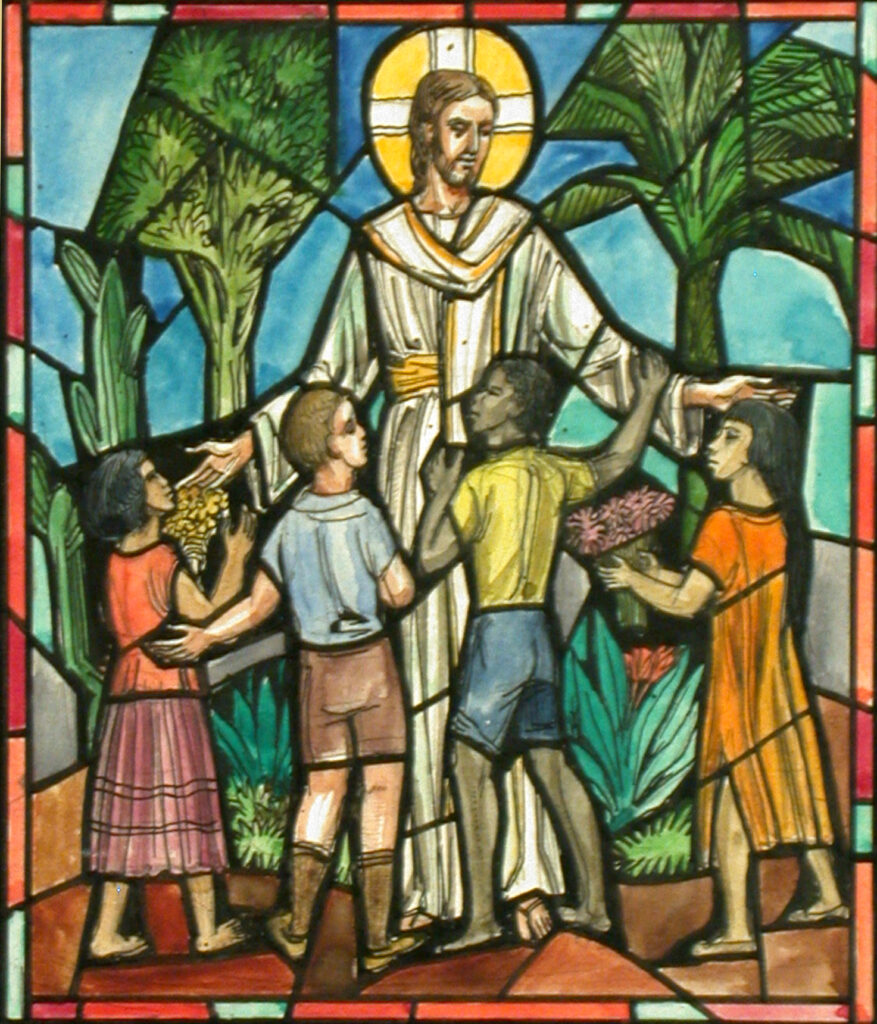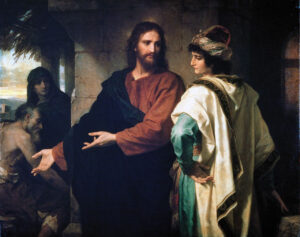Barekmor
Glory be to the Father, to the Son, and to the Holy Spirit,

Jesus blesses the children. The disciples thinking that they were giving honour to Christ, tried to prevent their coming. However, they were actually detracting from His glory. For just as a doctor cannot have recognition unless he has sick to heal, so Christ cannot save those who do not come to Him.
Children come to Jesus, and he says that to such the kingdom of heaven belongs. The Fathers focus on the phrasing, “of such” rather than “of these”. This points to the nature or the disposition of a child rather than the age of a child.
Some of the characteristics that the fathers encourage us to have are:
Recognising this way of life one of the fathers encourages us this way,
Therefore, beloved, the Lord instructs us that what they are by the gift of nature, we should become by the fear of God, a holy way of life and love of the heavenly kingdom; for unless we are alien to all sin just like children, we cannot come to the Saviour.1
and St. John Chrysostom challenges us this way,
Knowing then all these things, let us lay down these passions, that we may not both pay a penalty here, and there be punished without end. Let us become lovers of virtue. For so both before reaching the kingdom we shall reap the greatest benefits here, and when we are departed there we shall partake of the eternal blessings; unto which God grant we may all attain by the grace and love towards man of our Lord Jesus Christ, to whom be glory and might world without end. Amen.2
Let us then strive to have the nature of children.
I mentioned earlier the disciples were wrong in dissuading the children from coming to Jesus. However, even in the disciples doing this, the fathers see a picture of what Christ would do.
The children prefigure the Gentiles, to whom salvation is given through faith and the simple word. But since the goal was first to save Israel, they were first prevented by the disciples from approaching. The action of the apostles is not about their personal desires but rather their serving as a prefiguring of the future proclamation of the gospel to the Gentiles. The Lord says that the children should not be prevented because “theirs is the kingdom of heaven”; for the grace and gift of the Holy Spirit was going to be bestowed on the Gentiles by the laying on of hands, when the work of the law ceased.3
This laying on of hands is very significant. As I said before we need to strive to have the nature of children, but we can only accomplish that through receiving grace. We receive grace through Christ laying hands on us through bishops and priests, through baptism, through the Eucharist and through other Mysteries. These things work hand in hand, we receive grace, and we strive to perfect His nature in our lives. We strive to attain the virtues and we receive grace from God. It is hard to say which action comes first.

The rich young ruler is a new event chronologically but it is still teaching us to acquire the virtues. We see in his approach to Jesus that he was earnestly seeking eternal life. The fathers tell us that it is true that he was greedy and loved his wealth, but we must be careful that we do not blame him for hypocrisy when there is no indication that he was attempting to deceive.
Notice also that Jesus does not criticize the teaching or the keeping of the law. The law is good as St. Paul testifies also in one of his epistles. Jesus says, “If you wish to enter into life, keep the commandments.” The emphasis here is on the word enter. This indicates the start of the route to life but not its completion. He is teaching us that while the law is not foreign to Himself, perfection itself must come from Him.
We see the earnestness or sincerity of this young man through both his questions and his reactions. He has come with the willingness to obey. He wants to know which commands to keep and if he has missed any. He is asking the Saviour for clarification since it is his desire to enter life.
However, he has come with too weak of a will. Riches have too strong a grip on his life. St. Augustin asks, what good does it do us to follow the law, if we are not willing to follow Christ.
I remember listening to Paul Washer share an illustration that highlights the truth of this situation.
There was a concert violinist that gave a beautiful performance without a mistake. Someone came up to them afterwards and said, “I’d give my life to play like that.” The violinist answered, “I did”.
For this young man, riches were the hurdle that his will couldn’t overcome. What is keeping each one of us from loving our neighbours fully. Are we willing to give our whole life to following Christ? The law is the starting point to the way of life, but following Christ has both greater rewards and a greater difficulty.
In the law, we have the starting point for justice, but in Christ we learn both to receive goodness and also to impart it. The law gives us access to the ground level of eternal life, but it isn’t sufficient to lead us to the higher life and perfection.
There is also a second part that Christ asks of this man, “Come, follow me.”. Simply abandoning the love of riches or whatever other vice that is holding you back is not enough. You must also follow Christ. Giving up the riches is only the beginning in preparing riches in the kingdom of heaven. We must both abandon evil and do good. We must walk in the steps of our Saviour. St. Theophylact of Ochrid tells us that many have abandoned their wealth but still led a life full of filth. Our salvation is ongoing. We must continue to follow and pursue Christ.
Origen tells us that the one who gives up his riches to become perfect, shall have assistance to become wise in Christ. We work out our salvation with fear and trembling with God also working in us. We must from that day forward spend time in contemplating God and learning His ways that we might be perfect.
Christ then compares the difficulty of rich being saved to that of a camel going through the eye of a needle. This is to show that for those who love riches it is impossible in the greatest degree for them to enter the kingdom of heaven.
The disciples were astounded when they heard this. St. John Chrysostom tells us that they were upset for the salvation of the rich. They were learning to have compassion on others. They would become teachers and this was a beginning step towards that end. Their desire was for the rich to be saved as well.
Impossible can become possible as St. John Chrysostom explains,
If you also want to learn the way and how the impossible becomes possible, listen. He did not make this statement that what is impossible for man is possible for God merely so you could relax and do nothing and leave it all to God. No, he said this so you could understand the importance of calling upon God to give you help in this rigorous contest and that you might more readily approach His grace.4
In the name of the Father, of the Son, and of the Holy Spirit
1 https://www.catenabible.com/mt/19/14
2 https://www.catenabible.com/mt/19/14
3 Thomas C. Oden and Manlio Simonetti, Ancient Christian Commentary on Scripture New Testament Ib (Downers Grove, IL: InterVarsity Press, 2002), 95
4 Ibid, 103
J. & R. Lamb Studios. Jesus Welcomes the Children, from Art in the Christian Tradition, a project of the Vanderbilt Divinity Library, Nashville, TN. https://diglib.library.vanderbilt.edu/act-imagelink.pl?RC=56639 [retrieved November 2, 2021]. Original source: http://www.loc.gov/pictures/resource/lambdc.04743/?co=lamb.
Another Homily on the Rich Young Ruler